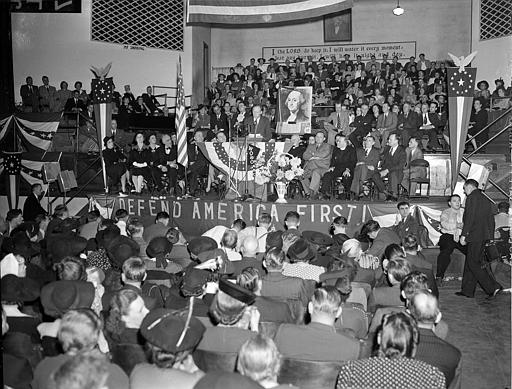Bush is not following the narrative. He was supposed to be a semi-harmless goofball the press and the Dems could run a few circles around before being defeated in 2004. Instead, 9/11 turned him into a president with strong ideas and stubborn resolve. He couldn’t be moved or swayed, not by editorial boards, not by marching millions, and..and…the 2002 election went his way! And his poll numbers wouldn’t go down, dammit, they just wouldn’t go down!I think the kid may have something!
Think about it - when do the conservative-bashers hate conservatives LEAST? When they can airily dismiss them:
- Pat Buchanan - they aren't as vicious about him as they have been of either Bush or Reagan. He's clearly over the edge, and has little influence. They can lightly bash him, but reserve the real venom for the more successful, and, hence, more threatening conservatives.
- Reagan's enemies were relatively nice to him toward the end, because his Alzheimer's made him less of a threat. They were far more vicious when he had the power to change things.
- John Paul II, once his infirmity made him less able to travel and bring his persuasive presence to discuss issues and confront tyrants. Those who opposed him dismissed his message, and implied that his illness had affected the functioning of his brain.
- Fraternities have produced 48% of all US presidents.
- Fraternities have produced 42% of US senators.
- Fraternities have produced 30% of US Congressmen.
- Fraternities have produced 40% of Supreme Court justices.
- George H. Bush (41)
- Both Roosevelts
- Liberal icon Dean Acheson
AFC advocated four basic principles:
1. The United States must build an impregnable defense for America.
2. No foreign power, nor group of powers, can successfully attack a prepared America.
3. American democracy can be preserved only by keeping out of the European war.
4. "Aid short of war" weakens national defense at home and threatens to involve America in war abroad.

Sound familiar? That was the group that aviator Charles Lindbergh was associated with. In his later speeches before the group, he indicated pro-Nazis sympathies. Some of their members may have actually supported the Nazis, but they were few. The Committee's viewpoint was relatively popular with some of the Anglophile upper classes, among them Joseph Kennedy, Sr., who had served as Ambassador to England. The Commitee disbanded right after Pearl Harbor was bombed. (Good timing!) While many were strong anti-Communists, the bulk of the membership was out of leftist-leaning elite Chicago. It never captured the grass-roots, and remained a safe way to bash Roosevelt over foreign policy. Not unlike today's anti-war left.
Lest we forget what over-zealous pacifism can lead to (from Scott Simon:
In 1933 the Oxford Student Union conducted a famous debate over whether it was moral for Britons to fight for king and country. The exquisite intellects of that leading university reviewed the many ways in which British colonialism exploited and oppressed the world. They cited the ways in which vengeful demands made of Germany in the wake of World War I had helped to kindle nationalism and fascism. They saw no moral difference between Western colonialism and world fascism. The Oxford Union ended that debate with this famous proclamation: "Resolved, that we will in no circumstances fight for king and country."Tags = Bush and News and Politics
Von Ribbentrop sent back the good news to Germany's new chancellor, Hitler: The West will not fight for its own survival. Its finest minds will justify a silent surrender.
In short, the best-educated young people of their time could not tell the difference between the deficiencies of their own nation, in which liberty and democracy were cornerstones, and a dictatorship founded on racism, tyranny and fear.
1 comment:
Hi I just posted some cool quotes by JPII. I have enjoyed reading through your archives (i linked over here from a blog search) I would love to establish a reciprocal link with your blog, if you're interested, let me know
www.debaterelatepontificate.blogspot.com
Post a Comment